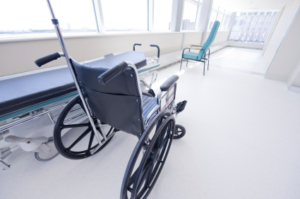New in Medicaid Medical Transportation: Uber and Lyft
State Medicaid programs focused on ensuring that beneficiaries keep their doctor appointments are increasingly looking to ride-sharing services to supplement the providers already participating in their medical transportation programs.
 Today, Lyft is working with approximately 35 state Medicaid programs while Uber, at least so far, participates only in Arizona’s program.
Today, Lyft is working with approximately 35 state Medicaid programs while Uber, at least so far, participates only in Arizona’s program.
While ride-sharing is not going to replace other medical transportation programs – for one thing, most Uber and Lyft cars are not equipped to serve individuals with serious disabilities – they can help supplement services that today typically require patients to reserve rides days ahead of time and then share van rides with other patients.
To facilitate the use of ride-sharing services, several state governments have eased regulations that require people who drive Medicaid beneficiaries to undergo first-aid training and drug testing.
While ride-sharing is not yet a formal part of Pennsylvania’s Medical Assistance Transportation Program, pilot programs using such services are currently under way in Allegheny County and Philadelphia.
Learn more about how ride-sharing is moving into the Medicaid medical transportation industry in the Kaiser Health News article “Uber And Lyft Ride-Sharing Services Hitch Onto Medicaid.”
 Instead, patients previously served by Hahnemann University Hospital, a Pennsylvania safety-net hospital that served especially large numbers of Medicaid and uninsured patients, are now being served by other safety-net hospitals in Philadelphia: mostly, Jefferson Health, the University of Pennsylvania Health System, Einstein Healthcare Network, and Temple University Hospital. All report increased volume in their emergency rooms, more ambulance arrivals, and more inpatient admissions, but at least so far, they also report that they are comfortably handling the increased patient volume created when Hahnemann closed its emergency room and discharged its last patients in July.
Instead, patients previously served by Hahnemann University Hospital, a Pennsylvania safety-net hospital that served especially large numbers of Medicaid and uninsured patients, are now being served by other safety-net hospitals in Philadelphia: mostly, Jefferson Health, the University of Pennsylvania Health System, Einstein Healthcare Network, and Temple University Hospital. All report increased volume in their emergency rooms, more ambulance arrivals, and more inpatient admissions, but at least so far, they also report that they are comfortably handling the increased patient volume created when Hahnemann closed its emergency room and discharged its last patients in July. In the message, SNAP notes the important role Medicaid DSH payments play in helping private safety-net hospitals care for the many uninsured patients who continue to turn to them for care.
In the message, SNAP notes the important role Medicaid DSH payments play in helping private safety-net hospitals care for the many uninsured patients who continue to turn to them for care. While observers warn that it is difficult to attempt to render a final verdict on the reform law’s insurance expansion and its impact, various studies and observations point to encouraging developments. Among them:
While observers warn that it is difficult to attempt to render a final verdict on the reform law’s insurance expansion and its impact, various studies and observations point to encouraging developments. Among them: Cuts in Medicaid disproportionate share hospital (Medicaid DSH) allotments to states were mandated by the Affordable Care Act based on the expectation that the law would greatly reduced the number of uninsured Americans. While this has been the case, the decline in the number of uninsured has not been as great as expected. For this reason, Congress has on several occasions delayed the required Medicaid DSH cut.
Cuts in Medicaid disproportionate share hospital (Medicaid DSH) allotments to states were mandated by the Affordable Care Act based on the expectation that the law would greatly reduced the number of uninsured Americans. While this has been the case, the decline in the number of uninsured has not been as great as expected. For this reason, Congress has on several occasions delayed the required Medicaid DSH cut. The proposal will be considered by the Senate Health and Human Services Committee.
The proposal will be considered by the Senate Health and Human Services Committee.